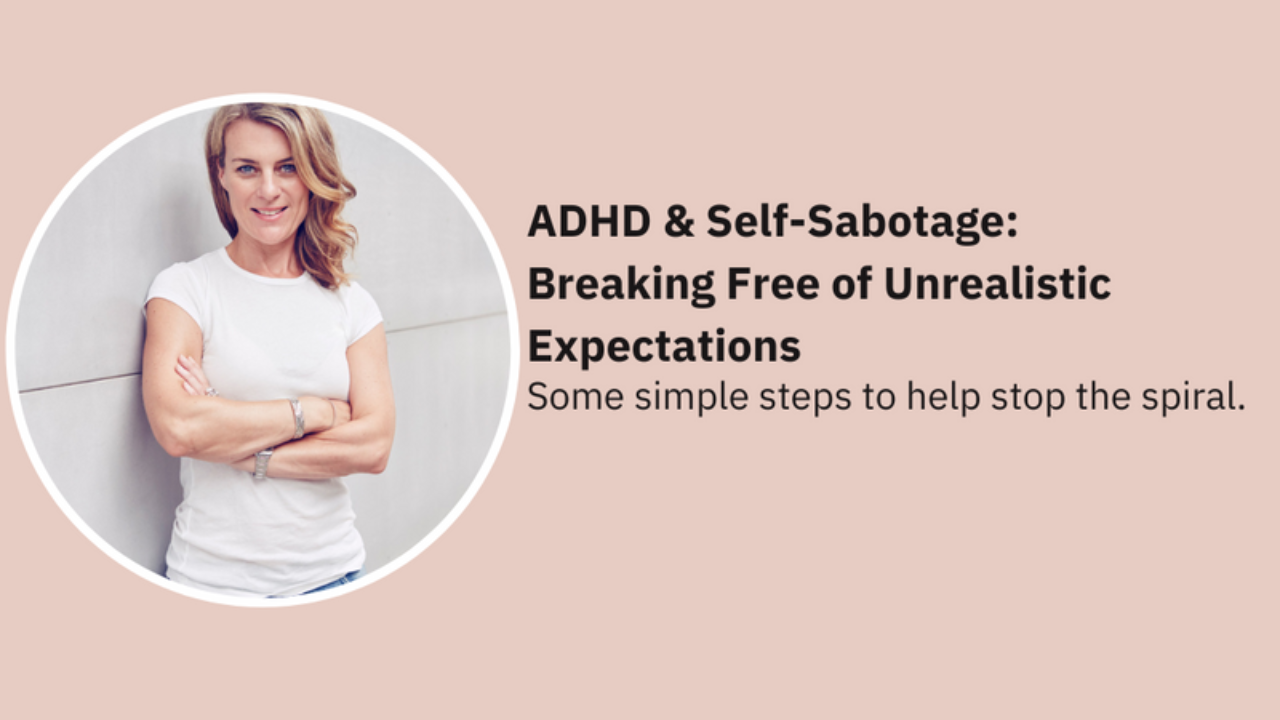ADHD & Self-Sabotage: Breaking Free from High Expectations
Mar 21, 2025
What Is ADHD-Related Self-Sabotage?
Self-sabotage in individuals with ADHD is a pattern of behaviours and thoughts that interfere with progress. It often appears as perfectionism, avoidance, procrastination, or overcommitment—all driven by a deep-seated fear of failure or not being "good enough."
Many people with ADHD set unrealistically high expectations for themselves, leading to frustration when those expectations aren’t met. This fuels negative self-talk, reinforcing a cycle of guilt, shame, and self-doubt. Instead of recognising the challenges of an ADHD brain, many internalise struggles as personal failures.
A study on perfectionism in ADHD found that individuals with the condition tend to overcompensate for their perceived shortcomings, leading to self-imposed pressure that increases stress and avoidance.
Why Does Self-Sabotage Happen in People with ADHD?
1. Perfectionism & High Expectations
Many individuals with ADHD feel they need to prove their competence by achieving impossible standards. However, research shows that perfectionism is a major contributor to anxiety, procrastination, and avoidance behaviours. When expectations are too high, the brain perceives the task as overwhelming, leading to task paralysis or abandoning goals altogether.
2. Executive Function Challenges
ADHD directly affects executive functioning—the brain’s ability to plan, prioritise, and follow through on tasks. Studies have shown that those with ADHD struggle more with task initiation and sustained attention compared to neurotypical individuals. When high expectations clash with difficulties in organisation and time management, it can lead to paralysis and avoidance, reinforcing self-doubt.
3. Negative Self-Talk & Imposter Syndrome
Many people with ADHD have spent years masking their struggles, feeling they need to work twice as hard to prove themselves. This often results in self-doubt, imposter syndrome, and fear of being "found out" as incapable. A 2023 study found that individuals with ADHD are more likely to experience imposter syndrome, particularly in professional and academic settings.
4. Rejection Sensitivity Dysphoria (RSD)
ADHD brains are wired to be extra-sensitive to perceived rejection or criticism, making setbacks feel more painful and personal than they actually are. This emotional response can push individuals into self-sabotaging behaviours like quitting too soon or avoiding challenges altogether. Research from CHADD (Children and Adults with ADHD) suggests that RSD is one of the leading causes of avoidance and self-sabotage in ADHD individuals.
How to Take Charge & Minimise Self-Sabotage
Breaking the cycle of self-sabotage means reframing expectations, using ADHD-friendly strategies, and building self-compassion. Here are six actionable steps:
1. Set Realistic Goals & Adjust Expectations
- Instead of: "I need to get everything perfect on the first try."
- Try: "Progress matters more than perfection."
A study on ADHD-friendly goal setting found that breaking tasks into small, manageable steps reduces overwhelm and increases task completion rates.
📌 Try This:
✅ Set a realistic daily goal (e.g., “Complete 10%” instead of “Finish everything”)
✅ Write it down to make it concrete
✅ Give yourself permission to adjust the goal if needed
2. Use Body Doubling for Accountability
Body doubling—working alongside someone else (even virtually)—helps ADHD brains stay engaged and on track. A study published in ADDitude Magazine found that body doubling significantly improves focus and follow-through in individuals with ADHD.
📌 Try This:
✅ Use a focus app (Focusmate, Flow Club)
✅ Work on Zoom with a friend, even if they’re doing their own task
✅ Ask for external check-ins (e.g., text a friend after completing a task)
3. Practice Self-Compassion Over Self-Criticism
➡ ADHD brains tend to focus on what went wrong instead of what went right. Negative self-talk keeps us stuck.
Quick Fix: Instead of “I never get anything done,” say “I am learning how to work with my ADHD.”
📌 Try This:
✅ Write down 3 small wins every day (even if it’s “I sent an email”)
✅ Create a “High Vibe File”—a folder with positive feedback & reminders of your successes.
✅ Practice talking to yourself like you would a friend—you deserve encouragement, too!
4. Create an ADHD-Friendly Action Plan
➡ ADHD brains need clear steps, deadlines, and external cues to stay on track.
A study from Neurodivergent Insights found that people with ADHD are more likely to succeed when tasks are visually mapped out, broken down, and time-blocked.
📌 Try This:
✅ Time block tasks into 15-30 min chunks
✅ Use a visual countdown timer to stay engaged
✅ Pair low-interest tasks with rewards (e.g., listen to music while doing admin work)
5. Reframe “Failure” as Learning
➡ ADHD brains learn best by trial & error—but fear of failure keeps us stuck.
A 2024 study on growth mindset in ADHD found that viewing failure as a learning experience instead of a personal flaw improved confidence and motivation.
Quick Fix: Instead of “I failed,” say “I learned what doesn’t work—now I’ll try something else.”
📌 Try This:
✅ When a task doesn’t go well, write down one thing you learned
✅ Replace “I messed up” with “This was an experiment”
✅ Create a “Next Time Plan”—adjust strategies & try again
Final Thoughts: You Are Not Broken—You Are Wired Differently
Self-sabotage in ADHD isn’t about laziness or lack of willpower—it’s about understanding how your brain works and adapting your approach.
💡 The goal isn’t to “fix” yourself—it’s to create strategies that work for your ADHD brain.
🔹 Focus on progress, not perfection
🔹 Create small wins & build momentum
🔹 Be kind to yourself—you are doing your best
Until next time,
Caroline Beresford
ADHD & Executive Function Coach - Founder of TAP
JOIN OUR NEXT SMALL GROUP COACHING PROGRAM
📅 Start Date: Wednesday 26th March 12 midday AEDT
🎟 Limited spots available—register today!
We hate SPAM. We will never sell your information, for any reason.
